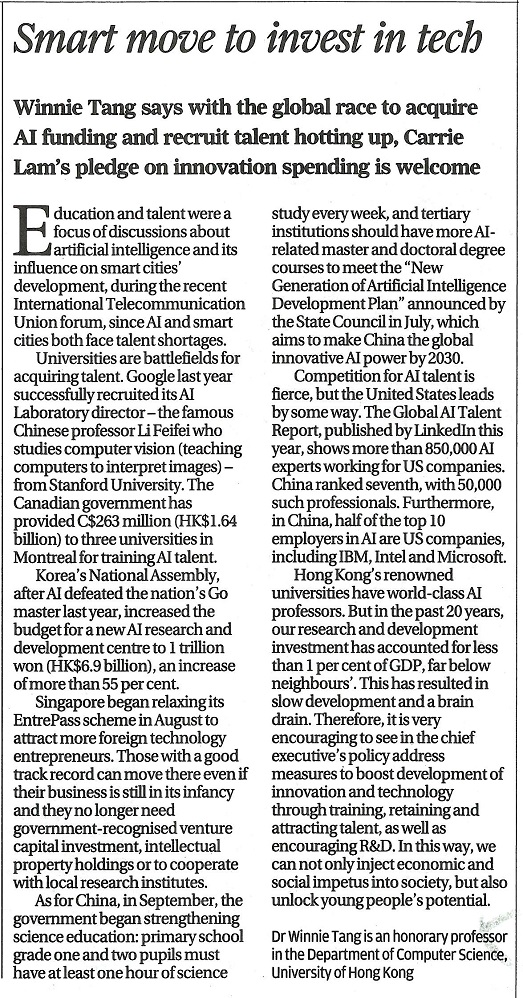網上版請按此

Smart move to invest in tech
Winnie Tang says with the global race to acquire AI funding and recruit talent hotting up, Carrie Lam's pledge on innovation spending is welcome
Education and talent were a focus of discussions about artificial intelligence and its influence on smart cities' development, during the recent International Telecommunication Union forum, since AI and smart cities both face talent shortages.
Universities are battlefields for acquiring talent. Google last year successfully recruited its AI Laboratory director – the famous Chinese professor Li Feifei who studies computer vision (teaching computers to interpret images) – from Stanford University. The Canadian government has provided C$263 million (HK$1.64 billion) to three universities in Montreal for training AI talent.
Korea's National Assembly, after AI defeated the nation's Go master last year, increased the budget for a new AI research and development centre to 1 trillion won (HK$6.9 billion), an increase of more than 55 per cent.
Singapore began relaxing its EntrePass scheme in August to attract more foreign technology entrepreneurs. Those with a good track record can move to the city state even if their business is still in the exploratory stage and they no longer need government-recognised venture capital investment, intellectual property holdings or to cooperate with local research institutes.
As for China, in September, the government began strengthening science education: primary school grade one and two pupils must have at least one hour of science study every week, and tertiary institutions should have more AI-related master and doctoral degree courses to meet the "New Generation of Artificial Intelligence Development Plan" announced by the State Council in July, which aims to make China the global innovative AI power by 2030.
Competition for AI talent is fierce, but the United States leads by some way at present. The Global AI Talent Report, published by LinkedIn this year, reveals there are more than 850,000 AI experts working for US companies. What about China? It ranked seventh with 50,000 such professionals. Furthermore, in China, half of the top 10 employers in AI are US companies, including IBM, Intel and Microsoft.
Hong Kong renowned universities with world-class AI professors. In the past 20 years, however, our research and development investment has accounted for less than 1 per cent of GDP, far below neighbouring cities and nations. This has resulted in slow development and a brain drain.
Therefore, it is very encouraging to see in the chief executive's policy address measures to boost development of innovation and technology through training, retaining and attracting talent, as well as encouraging R&D. In this way, we can not only inject economic and social impetus into society, but also unlock young people's potential.
Dr. Winnie Tang
Honorary Professor, Department of Computer Science, The University of Hong Kong